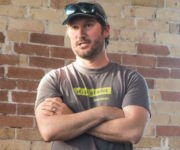Meet the Match
A Peruvian Sports Icon Makes Waves for Disabled Athletes
Francisco Arbulu always felt at home with his feet off the ground.
Francisco, or “Pancho” as he prefers, was born and raised in Piura, Peru. From the time Pancho was a boy, his father, a retired commercial airline pilot and member of the Peruvian Air Force, would rent private planes to take his son on flights. He hoped Pancho would follow in his footsteps. After graduating secondary school, Pancho fulfilled his father’s wish, earning both his private and commercial licenses.
For more than a decade, Pancho piloted airplanes for Aero Condor, Aero Continente, Taca and other airlines. Then, in 2006, as he was on his way to the airport he was involved in a car accident that left him with a C5 spinal cord injury.
The accident was devastating for Pancho. Before his injury, any moment not spent in the air was spent on the open ocean. A talented surfer, he traveled throughout the Americas searching for the best spots to practice his sport. But, in his new life as a wheelchair user, he was convinced his life as a surfer was over.
Away from airplanes and surfboards, Pancho felt confined and unfocused. Finally, on the third anniversary of his car accident, he picked up the phone and told a friend who had sent him countless invites that he’d finally join him for a surf session at Punta Hermosa beach. Anxious, he had no idea what to expect.
“At first, I felt afraid,” Pancho recalls, “but when we went inside the water all the fear washed away. My mind and were refreshed. It felt like I was a new person at this moment.”
After returning home that night, Pancho searched online until he found links to articles about adaptive surfing. He set his sights on competing again. Almost a decade later, he has been a regular at competitions around the world, finishing fourth (2016) and sixth (2017) in his category at the ISA World Adaptive Surfing Championships, while reaching the quarterfinals of the 2017 Hawaii Adaptive Surfing Championships and winning the 2017 Latin American Adaptive Surf Championships.
A year after he hit the water again in 2009, Pancho felt rejuvenated to rejoin the workforce. He applied for a position as a ground instructor with Avianca, the second largest airline in Latin America. Nobody had expected a wheelchair user to apply for this position, but Pancho persevered and was hired. He is now in his eighth year as a ground instructor with the airline.
“For someone who didn’t have a disability, when you have an accident you get depressed and you stop believing you can make something of your life,” Pancho says. “But then you meet other people in your situation and you realize sport can change that mentality. It’s about getting out of your comfort zone and facing people, your community, your country, and all the barriers you face as someone with a disability.”
While he has persevered, many challenges face people with disabilities in Peru. According to government statistics, approximately 5 percent of the population (1.6 million people) has a disability. According to these same statistics, almost 90 percent do not have access to rehab or therapy, 81 percent do not know where to go to access services, and 77 percent do not actively participate in the economy. A report from 2012 found that around 23,000 Peruvians with disabilities were prevented from voting, cashing checks, or distributing property to family because they were either not issued national ID cards, or these cards listed their disability.
The situation transcends into the world of sports, where there few programs exist to serve people with disabilities. In Lima, Peru’s capital and the city where Pancho now lives, there is not a single adaptive sports program.
Pancho arrived to the U.S. Department of State Global Sports Mentoring Program with a strong desire to bridge this gap. Pancho took part in the GSMP with Juan Castillo—his personal assistant from Peru—by his side to support him along the way. He aims to create a grassroots program in Lima to encourage people with disabilities to practice sports such as adaptive surfing, wheelchair basketball, wheelchair tennis and long-distance racing. At his mentor site, National Ability Center, he worked with Steve Robinson, global education manager. An organization with a 30-year history of supporting people with disabilities through sports, NAC provides opportunities in more than 10 sports, including aquatics and water sports, and provided more than 37,000 lessons and outings in each of the previous three years. Steve and his team provided Pancho with the knowledge and systems he needs to develop similar programs, and together their collaboration has the potential to lead a transformational wave of adaptive sports development in Peru.

